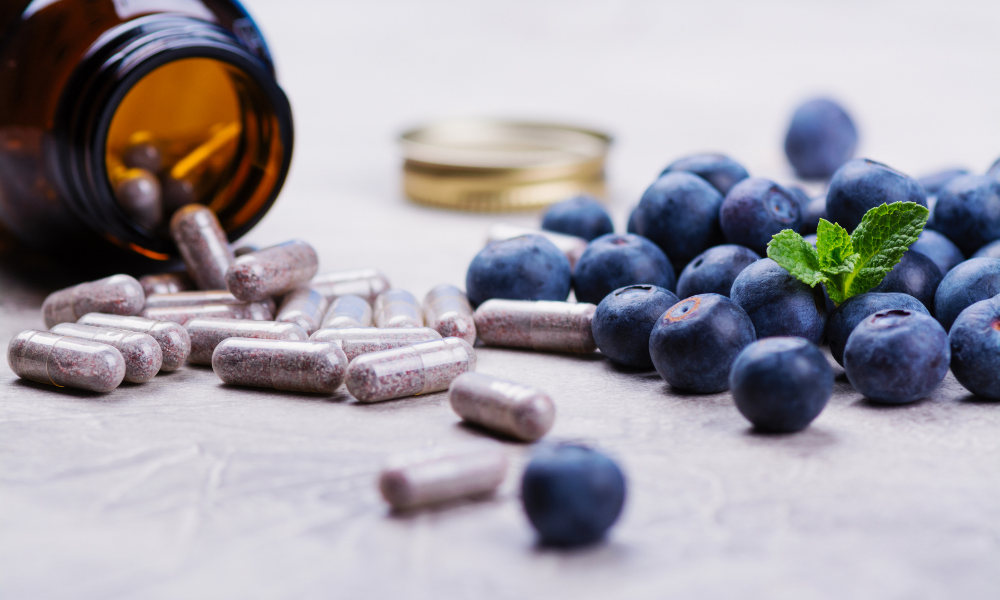According to the German Medical Journal, around 6.2 million people nationwide are affected by depression every year. [1] This means that this illness is rightly considered a widespread disease. But what can be done - apart from medication and therapy - to combat this mental illness? What role does nutrition play, or more precisely, what role does the supply of vitamins and minerals play? We have examined the topic and will tell you whether and how vitamins can help those affected to fight depression.
IT'S WORTH READING!
AT THE END OF THE ARTICLE WE WOULD LIKE TO GIVE YOU A LITTLE JOY WITH A VOUCHER!
Depressed? Or just in a bad mood?
According to the German Medical Journal, around 6.2 million people nationwide are affected by depression every year. This means that this illness is rightly considered a widespread disease. [1]
Depression is an illness in the medical sense that is anything but a temporary phase or a low mood. It is a serious mental illness that requires treatment because it massively influences the thoughts, feelings and actions of the affected person. [2]
And as if that wasn't bad enough, depression can cause various bodily functions to malfunction, causing you to suffer even more.
But when is the diagnosis of “depression” made?
If at least two of three main symptoms with at least two accompanying secondary symptoms occur over a period of two weeks - or longer - then this is a mental illness. Even though celebrities in particular keep making headlines because of depression-induced suicide, there are now various ways to treat this illness.
The website of the German Depression Help Foundation lists the three main symptoms - including additional symptoms: [3]
Depressed mood
Many sufferers report that they can no longer perceive their own feelings. They describe their inner self as “empty” and are often sad and depressed. They say they feel “petrified”.
Lack of interest or joy
Everything that was important is suddenly unimportant. Interest in things that were previously fun and brought joy has (almost) completely disappeared. This also applies to activities with your own family, hobbies or your favorite sport.
Lack of motivation or increased fatigue
It is particularly difficult for those affected to pull themselves together. There seems to be hardly any energy and even everyday things, such as shopping or brushing your teeth in the morning, seem like impossible tasks. This leads to a situation where at some point less and less is done because it is simply no longer manageable. In addition, there is usually a complete inability to make decisions even in the most mundane things of daily life.
The difference between depression and being depressed is probably a little more obvious now, right?

The chemistry in the head is no longer right
Depression usually has not just one cause, but many different reasons. Genetic predisposition plays a role, as do psychosocial and neurobiological factors. [4]
And like so many things in the body, moods and feelings are regulated by hormones, neurotransmitters and other chemical substances. In a depressive illness, these substances, among others, become unbalanced. One measure against this is the administration of antidepressants, which are intended to restore this balance. [5]
It has now become established that nutrition - especially vitamins and minerals - could have a positive effect on the course and severity of this disease.
The idea: nutrients influence our brain metabolism. Because different nutrients probably have a direct effect on the levels of dopamine, serotonin or noradrenaline, certain foods could have a positive influence on our brain chemistry. [6]
So can diet be a step towards healing? Let's look at the role of vitamins and minerals in treating depression!
Vitamins: The solution for those affected?
It is now widely known that vitamins are vital for a healthy metabolism. The benefits of various vitamins, such as vitamin C , B vitamins , vitamin D and vitamin K , are also no longer a secret.
However, their role in brain metabolism is less well known to most people. For example, vitamins B12 and C, together with folic acid, support the synthesis of dopamine and noradrenaline. For this reason, a possible undersupply of these nutrients could be linked to faulty brain metabolism and have a negative impact on one's mood. [7]
Of course, vitamins are not a miracle cure for depression; an orange alone does not put you in a good mood. However, a healthy diet rich in vitamins can be a helpful basis for treating various illnesses.
Time to take a closer look at vitamins and their effects:
Different vitamins and their effects on depression
Vitamins are not a miracle cure for depression or a cure for it. However, a healthy, vitamin-rich diet can be helpful as a fundamental part of treatment.
The B vitamins
First, we'll look at a whole group of vitamins, the water-soluble B vitamins. Do they play a role when it comes to depression?
A study from the University of Pleven, published in the Journal of Biomedical and Clinical Research in 2017, concluded that people with a vitamin B12 deficiency are more likely to suffer from depression or anxiety. [8]
As we mentioned above, serotonin is important. Among other things, this chemical compound regulates our sleep-wake cycle and has antidepressant properties. The vitamins niacin (B3), pyridoxine (B6) and folic acid (B9) are essential for its production.
In addition to the synthesis of serotonin, vitamins cobalamin (B12) and B6 are also needed for the production of dopamine and GABA (gamma-aminobutyric acid, also written γ-aminobutyric acid ). GABA, another neurotransmitter, is said to have a calming effect on nerve cells, which is said to lead to less anxiety and stress. [9]
Here is a list of other studies that link B vitamins to their effectiveness in treating depression:
- A 2015 study found a link between vitamin B12 and folic acid deficiency and an increased risk of depression. It also considered supplementation with nutritional supplements to reduce symptoms of depression in certain populations. [10]
- The results of a study published in the Open Neurology Journal in 2013 showed a possible effectiveness of vitamin B12 in combination with antidepressants in people suffering from major depressive disorder (MDD) [11]
- Researchers at Kyoto University found that depressive symptoms could be improved by vitamin B6 when given together with other nutrients - a form of vitamin B3 called nicotinamide and tryptophan . [12]
- An article in the German Medical Journal, which cites various studies, highlights the connection between a deficiency in vitamin B12 and depression. [13]
Despite the extensive research in this area, the role that B vitamins actually play in mental health has not yet been conclusively clarified.

Vitamin D
The so-called “sunshine vitamin”, vitamin D , fulfils important functions in a large number of the body’s processes. These range from serotonin regulation to the protection of nerve cells and bone metabolism. [14]
The vitamin also plays a role in the issue of depression.
The results of a study published in the Indian Journal of Psychological Medicine in 2020 establish a link between people with depression and low or deficient levels of vitamin D. [15]
In another study published in the Journal of Chemical Neuroanatomy in 2004, Australian researchers showed that adequate levels of vitamin D may be important in mental illnesses such as depression. They found that vitamin D receptors are located in the areas of the brain associated with depression. [16]
But again, further research is needed before vitamin D can be recommended as a universal treatment for depression.
Other supplements that can help with depression
magnesium
This mineral is essential for your body. Magnesium is involved in over 300 processes in the body, it is needed as a nutrient for cells, tissues and organs. But it may also benefit people suffering from depression and reduce their symptoms, as suggested by a 2011 Australian study. [17]
Another randomized study from 2017 found that 126 patients suffering from mild to moderate depression were given 248 mg of magnesium daily for six weeks. The result: their symptoms improved significantly compared to the placebo group. [18]
But even with magnesium, there is still not enough evidence to use it successfully in treatment.
S-Adenosylmethionine
Although you may never have heard these names, your body actually produces them in the amino acid metabolism. This sulfur-containing chemical compound, also called SAM or AdoMet, may play a role in treating depression.
This is suggested by an analysis of eight studies published in 2020 on the Annals of General Psychiatry website. SAM appeared to improve symptoms of MDD, regardless of whether it was given alone or together with antidepressants. [19]
So, getting enough vitamins and minerals is a promising approach when it comes to treating the symptoms of depression. But there are a few more things you can do besides taking medication to help you feel better.
What else you can do
- Contact with fellow sufferers can help you to cope better with your illness. A first step would be to join a self-help group, for example.
- Even moderate exercise releases hormones in the body that can reduce symptoms of depression, so try to get some exercise - alone or in a group.
- The last thing you need is sleep problems. Lack of sleep can even contribute to your depression. So create a sleep schedule, pay attention to your sleep hygiene and give yourself enough rest.
- Seek help from family and friends. Speak openly about your illness. This is the only way to gain understanding and support.

Conclusion: Vitamins are not miracle cures, but they are helpful
Depression is a mental illness that affects millions of people worldwide. Although it is usually treated with medication and therapy, proper nutrition also plays an important role.
Vitamins, especially those in the B group, have a major influence on brain chemistry and mood due to their role in the formation of substances such as noradrenaline, dopamine and serotonin. If you suffer from depression, it is a good idea to have tests carried out to see whether you are getting enough of the nutrients mentioned.
If you think you are suffering from depression, you should consult a doctor or therapist immediately.
AS PROMISED, YOU WILL RECEIVE A 10% VOUCHER ON THE FOLLOWING PRODUCTS:
Vitamin B complex, Vitamin B complex forte, Vitamin D liquid, Vitamin D capsules, Vitamin D3/K2 liquid, Vitamin D3/K2 capsules, Magnesium
SIMPLY COPY THE CODE VITAMIN+V10 AND ENTER IT AT CHECKOUT.
Click here to shop
[1] https://www.aerzteblatt.de/nachrichten/sw/depression
[2] https://www.psych.mpg.de/840900/depression
[3] https://www.deutsche-depressionshilfe.de/depression-infos-und-hilfe/was-ist-eine-depression/diagnose-der-depression
[4] https://www.neurologen-und-psychiater-im-netz.org/psychiatrie-psychosomatik-psychotherapie/stoerungen-kranken/depressionen/ursachen/
[5] https://www.aerzteblatt.de/archiv/211336/Antidepressiva-Ungeahnte-effekte-der-therapie
[6] https://www.ncbi.nlm.nih.gov/pmc/articles/PMC7084175/
[7] https://pubmed.ncbi.nlm.nih.gov/15671130/
[8] https://www.sciendo.com/article/10.1515/jbcr-2017-0023
[9] https://www.ncbi.nlm.nih.gov/books/NBK107210/
[10] https://pubmed.ncbi.nlm.nih.gov/25644193/
[11] https://www.ncbi.nlm.nih.gov/pmc/articles/PMC3856388/
[12] https://pubmed.ncbi.nlm.nih.gov/31902864/
[13] https://www.aerzteblatt.de/archiv/61696/Ursachen-und-fruehzeitige-Diagnostik-von-Vitamin-B12-Mangel
[14] https://www.rki.de/SharedDocs/FAQ/Vitamin_D/Vitamin_D_FAQ-Liste.html
[15] https://www.ncbi.nlm.nih.gov/pmc/articles/PMC6970300/
[16] https://pubmed.ncbi.nlm.nih.gov/15589699/
[17] https://www.ncbi.nlm.nih.gov/books/NBK507265/
[18] https://www.ncbi.nlm.nih.gov/pmc/articles/PMC5487054/
[19] https://annals-general-psychiatry.biomedcentral.com/articles/10.1186/s12991-020-00298-z

















